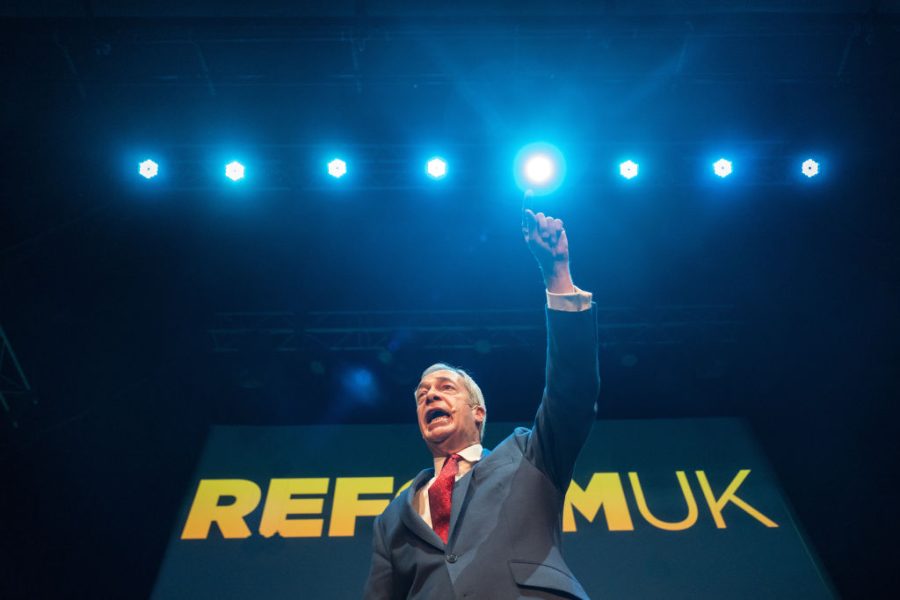British politics is in a new place: the combined polling score of Labour and the Conservatives is below 50 per cent for the first time in living memory.
The latest polls have Labour averaging 26 per cent and the Tories 23 per cent. This is a nine point reduction on the terrible combined score of 58 per cent that the two traditional main parties obtained on polling day last year – the lowest ever recorded at a general election.
The picture becomes even worse for the traditional duopoly if one drills down to public perceptions of them on the main political issues. Looking at YouGov’s regular series of 'which party would be best at…?' questions emphasises the point. In the latest data, released on 30 December, the combined Labour-Tory score on economic policy was down at 36 per cent (Labour 22, Tory 14). 'Don’t know' was the top answer, on 27. On health policy, the combined score was 35 per cent (Labour 24, Tory 11). On asylum and immigration, the combined score was just 29 per cent (Labour 15, Tory 14). 'Don’t know' (24) and 'other' (22) vied for top spot on this totemic issue. On education, that miserable combined score of 36 raised its head again (Labour 22, Conservative 14). On every main issue, support for Labour has fallen off a cliff since the election, while the Tories are basically flat-lining.
So the British public is diagnosing something close to total system failure: a situation under which neither the governing party nor the official opposition is widely believed to have any answers to the main problems of the day. Imagine how much trouble the monarchy would be in were Prince Andrew the King and Prince Harry the first in line to the throne and you’d be in the right ball park as to Britain’s current political crisis.
Several likely consequences flow from this. First, overseas examples of radical system change are liable to have a heightened capacity to reshape the preferences of the British public. The Trump administration in the US is the most obvious example but any regime in any major country, from Argentina to Italy, that does things differently and well is liable to have an impact. Secondly, the UK system is more wide open than ever before to a domestic insurgent force. And indeed, the rise and rise of Reform is the most notable trend in UK politics since Rishi Sunak fired Suella Braverman and hired David Cameron in his 'Daddy’s Home' centrist cabinet reshuffle of November 2023. Nigel Farage returning to the fray put rocket boosters under a process that was already under way. The Spectator's poll tracker currently has Reform averaging 25 per cent, splitting the traditional twosome and within reach of an outright lead.
Understandably, these trends are the cause of high excitement at Reform HQ, with party chairman Zia Yusuf widely disseminating them and using them to underline his preferred narrative of Reform being on track to form the next government. This ultra-bullish stance may be good for the purposes of further marketing the Reform brand, but if the party hierarchy regards it as an article of faith then it will come to regret that. Because it badly misdiagnosis the real state of play.
Reform is not on a cake walk to power, it merely has a rare and precious opportunity to 'break the mould', as Roy Jenkins once put it. As scholars of classical mythology will know, hubris is often followed by nemesis. There will be many gravitational forces that have protected the old duopoly thus far which come back into play during the run-up to the next election.
Right now, Reform needs to be working extra hard on tackling its weak spots. It certainly seems to be making strides in terms of developing a political 'ground game' – local branches, soaring grassroots membership, campaigning capacity. Its MPs, from Farage to Richard Tice, Lee Anderson to Rupert Lowe, are punching miles above their numerical weight when it comes to grabbing the media spotlight. Candidate selection is being tightened up too.
But there is one glaring, disabling shortcoming: policy formation. Reform’s current policy prospectus is a mess which could have been taken apart at the last election had that not been so dominated by a general public fixation on expelling the Tories. Its immigration agenda blithely relies on being able to deport undesirables with no explanation as to what will happen if other countries will not take them back. Its taxation policy contains a bizarre commitment to exempt NHS and social care staff alone from paying basic rate income tax.
The best thing Reform could do right now would be to hire an experienced and credible head of policy to overhaul and stress-test its offer. Icarus soared on waxen wings but the heat of the sun sent him tumbling rapidly back down to earth.








Comments